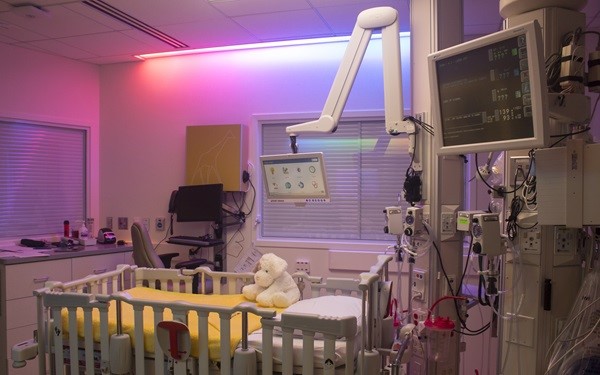A recently installed, state-of-the-art lighting system provided by Philips Lighting at University of Minnesota Masonic Children’s Hospital may help young patients heal by promoting natural circadian rhythms.
It’s a simple idea: When it’s light out, you are awake. When it is dark, you sleep.
Light exposure is one of several factors affecting our circadian rhythms, the innate rest and activity pattern each person follows.
But many patients who are in hospitals for extended periods of time experience circadian rhythm disruption because of health conditions, around-the-clock care, hospital noise and—most notably—light.
 |
|
The new Philips Lighting system has a number of settings that can be controlled by the patient or care team members, including an eye-catching light show display (pictured) designed to occupy patients during and uncomfortable procedure. The system is also designed to following natural light cycles during the day, which will reinforce a patient's circadian rhythms, and therefore promote healing. (Photo courtesy of University of Minnesota Masonic Children's Hospital) |
“Patients might wake multiple times during the night, then try to sleep during the daytime. Their body’s sleep schedule becomes disturbed,” said Pediatric Pulmonologist and Sleep Medicine Physician Helena Molero, MD, who sees patients at University of Minnesota Masonic Children’s Hospital. “There may be simple ways we can help their sleeping patterns and boost recovery.”
To mitigate the light disturbances affecting patients, Masonic Children’s Hospital has partnered with Phillips Lighting North America. Together, we are testing a new, state-of-the-art lighting system designed to improve comfort and accelerate healing on the hospital’s pediatric intensive care unit.
The system is specially designed based on important input from patients, families and care providers, all of whom consider lighting to be critically important in the hospital.
Research shows that a certain amount of exposure to light in the blue spectrum can alter the production of the hormone melatonin, which helps stabilize and control the body’s sleep and wake cycles. Limiting exposure to blue light may increase melatonin production, which facilitates sleep.
This patient-friendly LED lighting system will deliver light in specific wavelengths for specific periods of time. The system will also promote darkness during nighttime hours to help patients maintain and optimize their resting-waking circadian rhythm. The lighting system is both functional and fun. Using a remote, patients can control the lighting based on their personal preferences and needs. They will be also have the capability to start an eye-catching light show that can help distract them during an uncomfortable procedure, or simply break up the boredom during a long hospital stay.
Once fully installed, researchers at the hospital will begin to study how the variable lighting system affects patient’s recovery, hospital stay and other factors.
“The way patients react to light is an emerging area of study for many hospitals around the nation,” said Molero. “At Masonic Children’s Hospital, we’re exploring whether light might enable the body to heal more effectively with the promotion of healthy sleep patterns. By conducting research around our new lighting system, the hope is that we can improve our care delivery and patient outcomes.”
The lighting systems provided by Philips Lighting, which will be implemented in four pediatric ICU rooms, are made possible thanks to the generosity of donors to our Adopt A Room program. These individual and corporate partners sponsor the private, customized rooms, which promote better health outcomes and accelerate healing through their research-based, family-centered design and smart-room technology.
If you would like to learn more about the Adopt A Room program, please contact Nick Engbloom at engbloom@umn.edu.












